LGBTQ Divorce - The Law Office of Stephen Gassner
Table of Contents
Toggle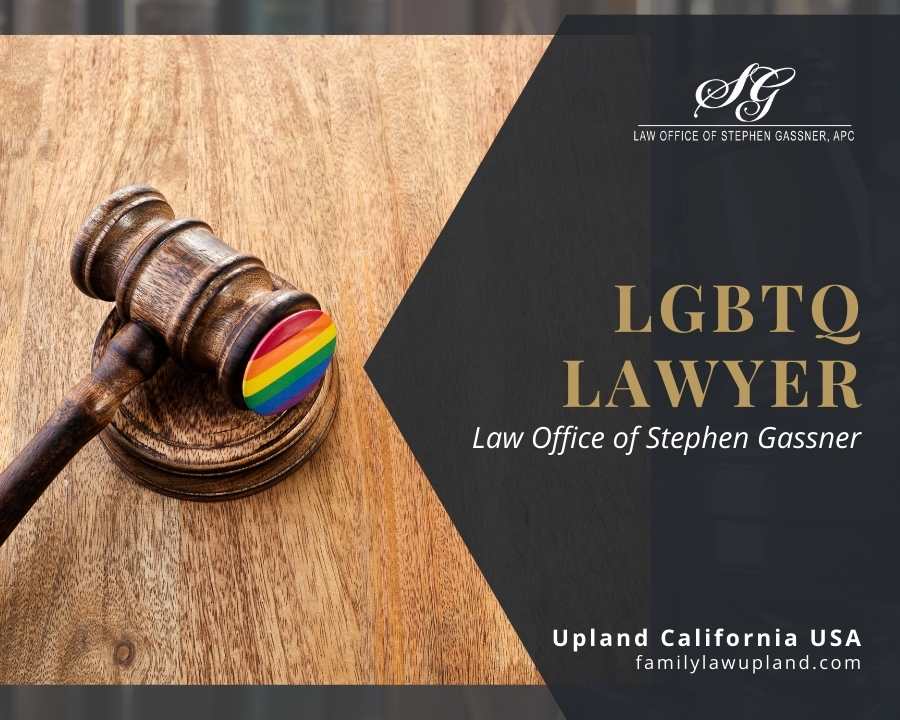
Divorce is never a simple process. Even though everyone has some hardships after a divorce, same-sex couples have unique difficulties and experiences. The divorce procedure for gay and lesbian couples is typically the same as for husbands and wives of the same sex. However, there are still certain distinctive features to same-sex divorce despite significant improvements in the societal acceptability of same-sex marriage. LGBTQ Lawyer Upland CA
If you are presently in a same-sex marriage and considering ending it, you must understand your legal options and rights. Unfortunately, the rules and processes regulating same-sex divorce are still being developed since same-sex marriage is a relatively new concept. Therefore, not every Upland, California divorce lawyer can guide you through your same-sex divorce. That is why you will need the assistance of a compassionate LGBTQ divorce lawyer who is well-versed in this developing area of the law.
Since 1995, Attorney Gassner has served clients in the Upland, California region as a certified family law attorney through the State Bar of California. LGBTQ divorce-related issues are welcome at our family law office. Along the road, we’ll be there to encourage and guide you. Contact us to find out how California handles same-sex divorces and what to expect during the process.
Californian Divorce Procedures
In the state of California, divorces may be obtained for any cause. Due to their irreconcilable differences, couples may choose to discontinue their marriage. However, initiating the divorce procedure is not required to prove anything to the courts or for any particular cause. No matter what the cause of the marriage’s dissolution is, California’s no-fault divorce laws allow the two same-sex spouses to get a divorce and legally end the union. After then, it’s crucial to speak with a lawyer to decide which course of action is best in these circumstances.
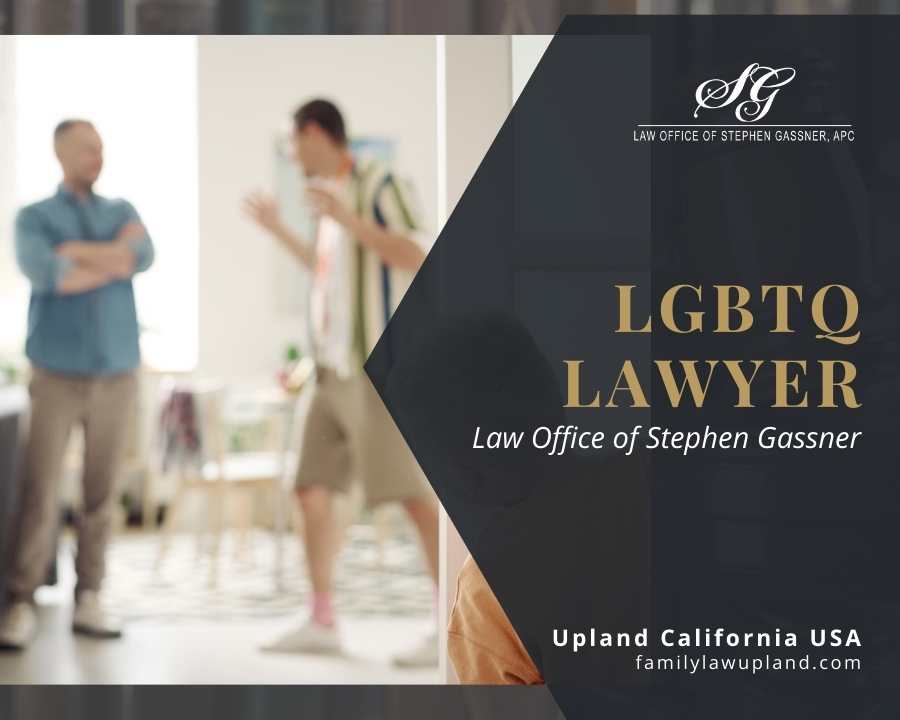
When all other conditions are satisfied, and the couple or domestic partners have been legally married in California for fewer than five years, they may proceed with a simple dissolution. One quick and straightforward approach to dissolving a marriage in the state is in this manner. There are restrictions on this procedure, such as the absence of biological children from either partner’s wedding. Even though the procedure is open to some in the state, it is doable when there are few assets, debts, or other issues that may make the divorce process drag on. Before choosing this course, it is crucial to confirm your eligibility.
Every couple that resides in California has the option of going through the common divorce procedure. After both couples file for divorce or when one spouse initiates the divorce process, this typically takes six months. The process may — and often do — get more drawn out when the two parties argue. The typical and required waiting time in this state is six months. Both parties may complete the necessary documentation, obtain the court’s approval of the divorce decree, and distribute all spouses’ affairs. However, six months must pass before the last step may be completed.
The Important Things to Consider
The potential points of contention between the marriage may lengthen the typical divorce procedure or any other employed in this state. These typically include any child support obligations and custody and visitation arrangements for any biological or adopted children of the marriage. Another crucial component often required when one works or when the two do not earn the same amount is spousal or partner assistance. Another pertinent and frequent problem that may drag out a divorce more than any other is the division of property. This will also call for dividing debts and assets.
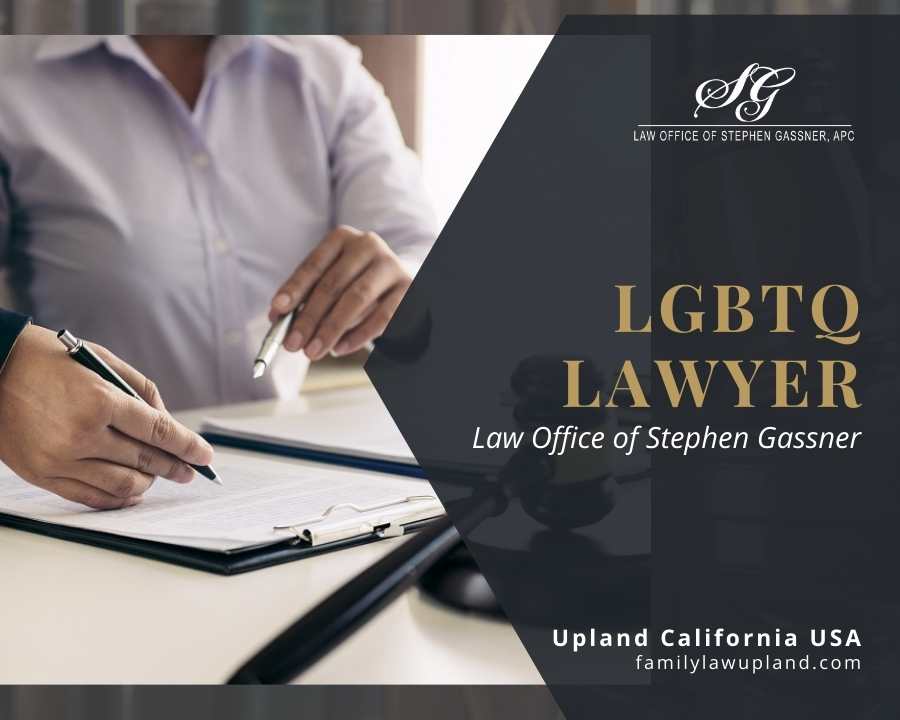
Alternatives to Divorce
Most states typically permit the use of an ADR (Alternative Dispute Resolution). Depending on the spouses and any particular concerns that need extra time to settle, this procedure might take a short or lengthy period. The couple will meet together in some form to talk about the crucial marital concerns that call for a legal resolution. These often resemble the issues that arise throughout a typical divorce procedure. They often include child support, visitation rights, property split, and the allocation of assets and liabilities. If the parties are willing to compromise rather than merely achieve what they want, several kinds of ADR may replace litigation and have a binding conclusion.
Before the two may settle their differences legally in California, the state often demands a regular six-month separation period. Both spouses may then determine the optimal ADR or traditional divorce procedure with the help of an attorney. Mediation is accessible if the two parties must discuss various issues. The arbitration may be used if mediation is too informal. There could be some additional alternatives to assist in handling specific cases, including the disagreements that made it necessary to end the partnership. Some couples may benefit from counseling or an ADR that offers therapeutic support to work through issues and reconcile or go through divorce amicably.
Challenges That a Gay or Lesbian Divorce in California Might Face
Here are four problems you can encounter if you are getting ready for lgbtq divorce in California:
1. Setting Up Parental Rights
In opposite-sex relationships, the spouse is assumed to be the father of any children born during the union. No such assumption is present for same-sex relationships. Therefore, you shouldn’t have any difficulties establishing parental rights after your divorce if you and your spouse went through the legal procedure of proving paternity (aside from the issues that confront all parents regarding the division of parenting time). Before discussing custody and visitation in your divorce, you must, however, resolve the issue of whether you are now legally recognized as your child’s mother or father.
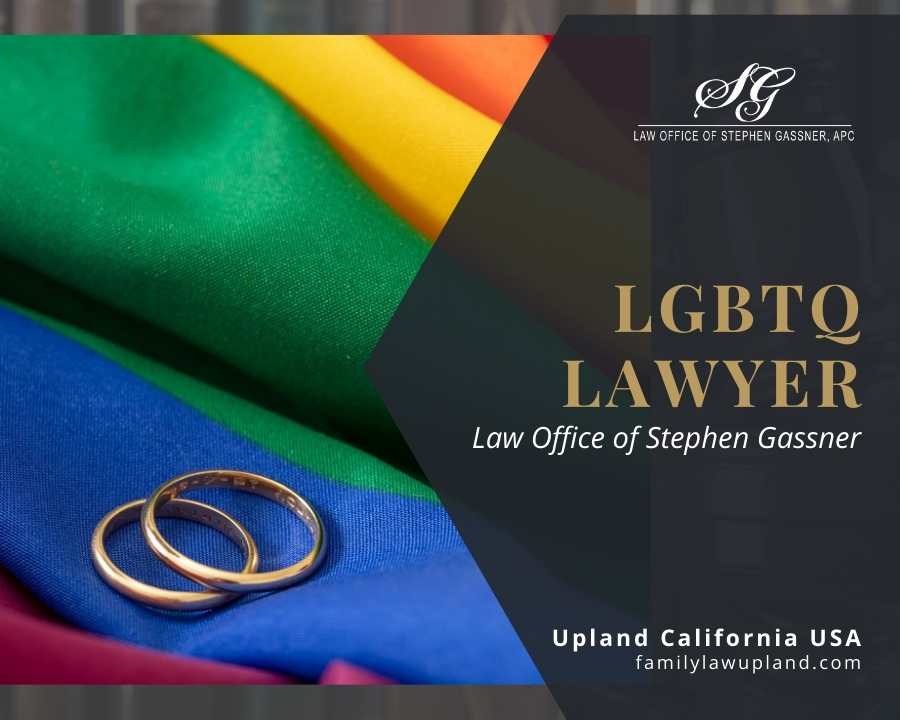
2. The Length of the Marriage
The length of your marriage is crucial in a California divorce for two reasons: it affects the amount and duration of alimony (if any), and the date of marriage determines the boundary between “separate” and “community” property. Therefore, the date of your marriage should be precise if you were wed in California after June 26, 2013 (or in any other state after June 26, 2015). On the other hand, if you lived together for a long time before being able to be married officially, this may cause issues with alimony and the distribution of communal property.
3. Asset Distribution for Retirement
Same-sex couples may need extra measures to share their retirement assets following their divorce due to the Defense of Marriage Act’s (DOMA) lingering effects (if one or both spouses’ retirement plans qualify as community property).
According to the IRS: A retirement plan must “[be] changed to conform with [United States v.] Windsor and Revenue Ruling 2013-17” if its provisions conflict with those of Windsor or the latter ruling. A plan must be changed, for instance, if it exclusively defines “spouse” as someone of the opposite sex or refers to section 3 of DOMA.
4. Having Access to Account Information and Employment Data
Unfortunately, gay and lesbian spouses still encounter difficulties in many practical ways, notwithstanding the equal protection provided to same-sex spouses in California in Hollingsworth v. Perry and the rest of the nation in Obergefell v. Hodges.
For instance, same-sex couples can have trouble accessing account information and work data following a divorce. Even while businesses are now legally compelled to treat same-sex spouses equally, you may likely run into difficulties acquiring this information if your partner isn’t willing to provide it.
Residency Requirements for Gay Divorce in California
Heterosexual couples seeking a divorce must live in California. However, this is not the case with LGBT couples. Why? For many years, California was one of just a select few states that permitted same-sex marriages. Consequently, LGBTQ couples from all over the country were married here. These days, such spouses could discover that filing for divorce in their home states is challenging. Even though same-sex marriage is legal everywhere, several jurisdictions make it very difficult for couples to enjoy their rights. Therefore, going through a divorce may be a lengthy or drawn-out procedure.
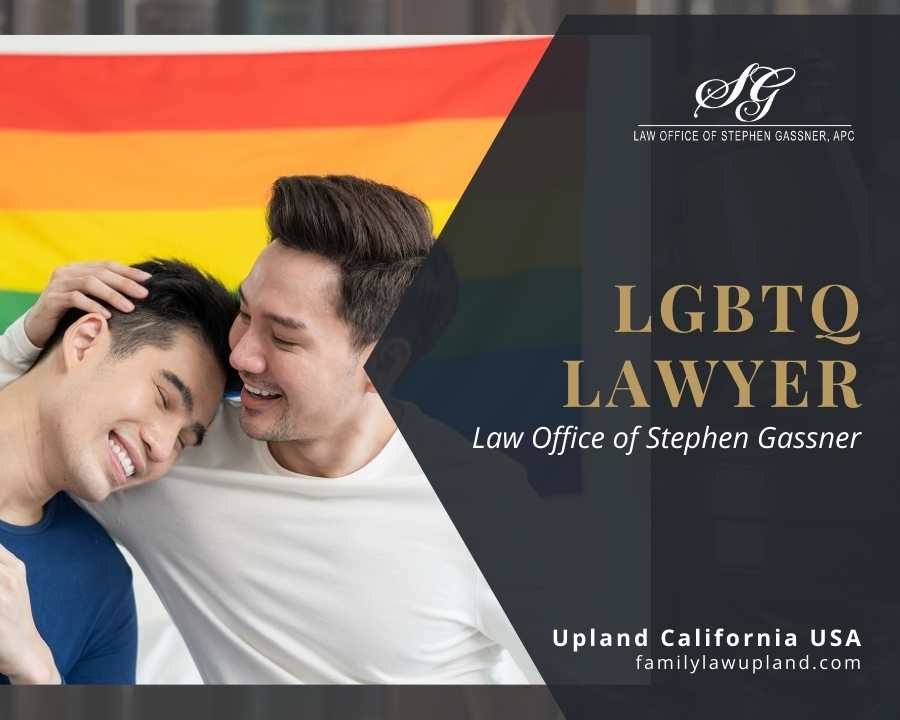
For same-sex couples, California waives the residence requirement. No matter where they presently reside, the state will grant divorce requests to couples who were wed there. It’s crucial to realize that California may not have jurisdiction over all legal matters about your divorce. Working with a skilled LGBTQ divorce attorney in California who can guide you through these very complicated scenarios is crucial.
Length of Divorce Procedure
Divorce cannot be initiated and concluded in a few days. Even if you and your spouse can agree on every detail of the divorce, this is still true. According to California law, the divorce procedure must last at least six months. The countdown typically starts when the spouse who files for divorce (the petitioner) presents the other spouse with the divorce papers in writing (the respondent).
A court has the right to evaluate your divorce petition once six months have passed. After that, the court will only approve your divorce if you have agreed to all pertinent conditions. The split of property, child custody, and visitation are examples.
Prenuptial Agreements May Assist in Preventing Issues
Many experts concur that creating a prenuptial agreement may help avoid or simplify many difficulties associated with LGBTQ divorce. For example, while California law may not take a couple’s 15 or 20 years of dating into account before marriage, a prenuptial agreement might if the pair chooses.
Couples of the same sex are more likely to get married later in life. Hence, their assets are larger than those of younger couples. As a result, a prenuptial contract may include clauses addressing asset partition, alimony, and child support. As a result, teams might move on more quickly, which can speed up the process of ending a marriage. In California, same-sex divorces provide many difficulties and issues, especially when dividing assets and property accumulated before marriage. Therefore, depending on their circumstances, every same-sex couple should carefully assess their alternatives and the viability of a prenuptial agreement.
Frequently Asked Questions
-
Does Adultery Apply to Same-Sex Marriage?
Adultery does not apply to same-sex marriage. Adultery, in law, only refers to sex between a man and a woman and is not applicable to same-sex partnerships. However, if your relationship ended because of adultery, you may be able to claim that this was “unreasonable behavior.” -
How Do I File a Divorce for the Same-Sex in California?
In California, the divorce procedure for same-sex couples begins with the filing of court documents, which is followed by a court hearing. Then, if the parties can agree on the critical issues, they may file for an uncontested divorce without the assistance of a lawyer. -
How Long Does it Take to Get a Divorce in California if Both Parties Agree?
Even if both parties consent to the split right away, the whole divorce procedure in the Golden State might take at least six months. Due to California’s divorce laws and the six-month waiting period, this amount of time is necessary.
Legal Support for LGBT Divorce in Upland, California
Same-sex couples will need legal representation to pursue the most suitable alternatives possible under the circumstances and to assert their claim while going through a divorce in California. Investigating this or finding a strategy to settle marital conflicts may be necessary.
The Law Office of Stephen Gassner in Upland, California has handled the trickiest and most sensitive family law cases. Divorce may be tremendously stressful, mainly if children are involved. We specialize in divorce-related cases, such as property partition, child custody, child support issues, etc. Set an appointment with our LGBTQ divorce attorney to learn more. We serve in the following areas of California, USA.
Family Law in Chino Hills, CA
Family Law Claremont, CA
Family Law in Eastvale, CA
Family Law in Fontana, CA
Family Law in Ontario, CA
Family Law in Rancho Cucamonga, CA
Family Law in Upland, CA
Looking for a Reputable LGBTQ Divorce Law Firm?
Or contact the Law Office of Stephen Gassner
At (909) 937-7000 Now!

